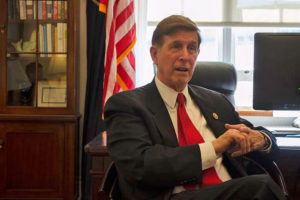 Rep. Don Beyer (D-Va.) led a letter with more than 40 Democratic colleagues highlighting rising health insurance premiums and criticizing Congress’ inaction.
Rep. Don Beyer (D-Va.) led a letter with more than 40 Democratic colleagues highlighting rising health insurance premiums and criticizing Congress’ inaction.
In a letter to House Speaker Paul Ryan, 46 Democrats said the lack of action to fund cost-sharing reduction (CSR) payments is hurting small business owners and the self-employed.
President Donald Trump announced he would end the payments, which help subsidize health insurance premiums, last month.
The Democrats said that House Republicans are blocking a “key solution” by not funding the CSRs through legislation, and it will only make things harder for individuals and business owners.
“We are hearing from entrepreneurs, small business owners and self-employed individuals who are being disproportionately impacted by the President’s decision,” they wrote. “We ask that you support our innovator economy and mitigate this financial burden by fulfilling cost sharing reduction payments.”
The full letter is after the jump.
Dear Speaker Ryan:
We are deeply concerned about the President’s decision to end the cost-sharing reductions (CSRs) and the devastating financial impact it will have on small businesses, working families, and the innovator economy. We ask that you commit to fund the CSRs and eliminate this barrier to innovation.
As you know, CSRs make health insurance more affordable by reducing cost sharing and out-of-pocket expenses like co-payments and deductibles in the non-group or individual market. In 2016, CSRs alleviated the cost of medical expenses for over 6.4 million enrollees. Now that President Trump has ended the Administration’s payment of the CSRs, absent a subsequent appropriation of funds or other action by Congress, we could see devastating impacts on our innovator economy.
We know that failure to fund CSRs will drive up premiums as insurers cover the cost and that some insurers will be forced out of the non-group market as a result. The Congressional Budget Office (CBO) and the Joint Committee on Taxation (JCT) anticipate that most insurance commissioners would permit insurers to substantially increase premiums in the marketplaces. This will primarily hurt millions of middle-class individuals, like the small businesses and self-employed individuals in our districts, who earn too much to qualify for premium assistance and will bear the full brunt of any rate increase. According to the Brookings Institution, uncertainty about these payments is perhaps the biggest threat to stability in the individual market. CBO and the JCT also estimate that this action also increases the federal deficit, on net, by $194 billion from 2017 through 2026.
According to the Kaiser Family Foundation, roughly one in five non-group marketplace consumers are small business owners or self-employed individuals. The Treasury Department identified non-group marketplace coverage as an important source of health insurance coverage for small business owners and the self-employed, noting that it provides insurance for a large share of self-employed individuals, particularly for middle-income workers. The UC Berkeley Center for Labor Research and Education highlights how the CSR eligible plans enabled small business owners and self-employed individuals to more easily obtain affordable health insurance and pursue entrepreneurial goals, also indicating that options like eliminating CSRs would disproportionately hurt self-employed and small businesses of less than 50 employees.
We are hearing from entrepreneurs, small business owners, and self-employed individuals who are being disproportionately impacted by the President’s decision. We ask that you support our innovator economy and mitigate this financial burden by fulfilling cost sharing reduction payments.

